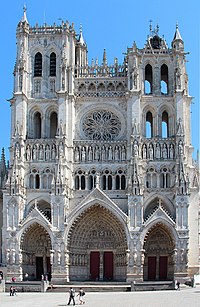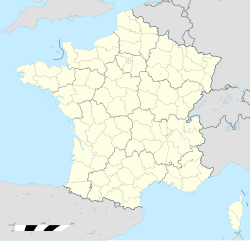Amiens Cathedral
| Amiens Cathedral | |
|---|---|
| Cathedral of Our Lady of Amiens | |
| French: Notre-Dame d'Amiens | |
 |
|
| 49°53′42″N 2°18′08″E / 49.89500°N 2.30222°ECoordinates: 49°53′42″N 2°18′08″E / 49.89500°N 2.30222°E | |
| Location | Amiens |
| Country | France |
| Denomination | Roman Catholic |
| Website | www |
| History | |
| Relics held | Alleged head of John the Baptist |
| Architecture | |
| Status | Cathedral |
| Functional status | Active |
| Architect(s) |
Robert of Luzarches Thomas and Regnault de Cormont |
| Style | Gothic |
| Years built | 13th century |
| Specifications | |
| Length | 145 m (476 ft) |
| Width | 70 m (230 ft) |
| Nave width | 14.60 m (47.9 ft) |
| Height | 42.30 m (138.8 ft) |
| Other dimensions | Façade: NW |
| Floor area | 7,700 square meters |
| Number of spires | 1 |
| Spire height | 112.70 m (369.8 ft) |
| Administration | |
| Diocese | Amiens |
| Province | Reims |
| Clergy | |
| Bishop(s) | Bishop Jean-Luc Bouilleret |
| Official name | Amiens Cathedral |
| Type | Cultural |
| Criteria | i, ii |
| Designated | 1981 |
| Reference no. | 162 |
| State Party | France |
| Region | Europe and North America |
| Session | 5th |
| Official name | Cathédrale Notre-Dame |
| Designated | 1862 |
| Reference no. | PA00116046 |
| Denomination | Église |
The Cathedral Basilica of Our Lady of Amiens (French: Basilique Cathédrale Notre-Dame d'Amiens), or simply Amiens Cathedral, is a Roman Catholic cathedral and seat of the Bishop of Amiens (currently Jean-Luc Bouilleret). It is situated on a slight ridge overlooking the River Somme in Amiens, the administrative capital of the Picardy region of France, some 120 kilometres (75 miles) north of Paris. It is the 19th largest church in the world.
Medieval cathedral builders were trying to maximize the internal dimensions in order to reach for the heavens and bring in more light. In that regard, the Amiens cathedral is the tallest complete cathedral in France, its stone-vaulted nave reaching an internal height of 42.30 metres (138.8 ft) (surpassed only by the incomplete Beauvais Cathedral). It also has the greatest interior volume of any French cathedral, estimated at 200,000 cubic metres (260,000 cu yd). The cathedral was built between 1220 and c.1270 and has been listed as a UNESCO World Heritage Site since 1981. Although it has lost most of its original stained glass, Amiens Cathedral is renowned for the quality and quantity of early 13th-century Gothic sculpture in the main west façade and the south transept portal, and a large quantity of polychrome sculpture from later periods inside the building.
The lack of documentation concerning the construction of the Gothic cathedral may be in part the result of fires that destroyed the chapter archives in 1218 and again in 1258—a fire that damaged the cathedral itself. Bishop Evrard de Fouilly initiated work on the cathedral in 1220. Robert de Luzarches was the architect until 1228, and was followed by Thomas de Cormont until 1258. His son, Renaud de Cormont, acted as the architect until 1288. The chronicle of Corbie gives a completion date for the cathedral of 1266. Finishing works continued, however. Its floors are covered with a number of designs, such as the bent cross (to symbolize Jesus' triumph over death). The labyrinth was installed in 1288. The cathedral contains the alleged head of John the Baptist, a relic brought from Constantinople by Wallon de Sarton as he was returning from the Fourth Crusade.
...
Wikipedia

